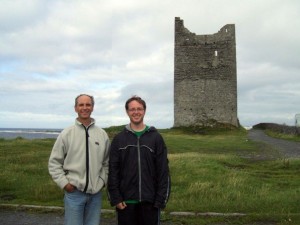Architect of the digital age
Politics Intersect Science, Again
2 December 2006
"Our best scientists will be doing their best work in laboratories overseas," said Robin Staffin, who directs the U.S. Department of Energy's high-energy physics division. "The frontier will be at this [CERN's Large Hadron Collider, or LHC] machine." For a U.S. scientific community that has held a leading role in particle physics at least since the Manhattan Project, this is an unfamiliar, and potentially deeply disturbing, change. Policy makers and educators are already worried about falling interest in math and sciences among U.S. students. Now, the prospect of seeing the world's leading high-energy physics laboratories move overseas is drawing strong calls for renewed investment, and even a few dire warnings of national decline. "Support for particle physics in the United States has stagnated," warned a recent high-profile report from the National Research Council that argues for taking the lead in the field's next multibillion-dollar project. "A strong role in particle physics is necessary if the United States is to sustain its leadership in science and technology over the long term." This call to arms is tempered both by scientific and economic realities, however. Projects on the scale of CERN's Large Hadron Collider, or LHC, cost billions of dollars, realistically putting them out of reach of even the richest nations acting alone. This has been a painful lesson for the U.S. physics community to learn. In the late '80s, the country had launched an ambitious project dubbed the Superconducting Supercollider, or SSC, which would have been even more powerful than CERN's new accelerator and would have helped cement U.S. laboratories' leading position for years to come. But in 1993, a deficit-shy Congress canceled the project after deep cost overruns, and after finding that other countries were reluctant to contribute financially to a project so dominated by the United States. That action helped open the door for the LHC, which was approved by CERN's European member states the following year. Science officials say those scars remain fresh in the American political memory, but that any new venture would be handled differently. "In discussions of large machines, the SSC is something like Caesar's ghost. It's definitely there," Staffin said. "But the LHC shows it can be done. We believe we have learned many of the lessons of SSC, such as the importance of internationalizing it, and the importance of strong oversight." This complicated mix of international scientific goals and national ambition is now helping drive particle physics' next multibillion-dollar proposal, a cross-border collaboration dubbed the [International Linear Collider](http://www.linearcollider.org/cms/), or ILC.
Let’s encourage our new Democratic overlords (who are also a deficit-shy Congress) to not repeat the mistake made by the Republican Congress in 1993. The ILC’s rough price tag of ~$8 billion is a drop in the bucket compared to recent US spending on the Iraq War: $5.8 billion per month. Which is more important? The choice is clear.
- Student Loan Bill Tracker
- The Anomaly Response Network
- The Mars Society
- Coca-Cola Scholars Foundation
- TechStars
- Leukemia & Lymphoma Society
- Cystic Fibrosis Foundation
- PRISM
- Free Bikes 4 Kidz
- Cincinnati Works
- Cincinnati Youth Collaborative
Reading:






Social